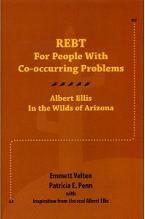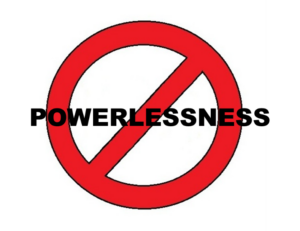Albert Ellis in the Wilds of Arizona
by Emmett Velten, PhD, & Patricia E. Penn, PhD
(with inspiration from the real Albert Ellis)
Professional Resource Press, 2010
Reviewed by A. Thomas Horvath, Ph.D.
 Perhaps you think Albert Ellis’ REBT (Rational Emotive Behavior Therapy) involves the mindless but forceful repetition of a few simple concepts. This book should change your mind. REBT, presented by Velten and Penn as RAPT (Rational Assessment and Personalized Treatment), is capable of deeply responding to the complexities and nuances of life.
Perhaps you think Albert Ellis’ REBT (Rational Emotive Behavior Therapy) involves the mindless but forceful repetition of a few simple concepts. This book should change your mind. REBT, presented by Velten and Penn as RAPT (Rational Assessment and Personalized Treatment), is capable of deeply responding to the complexities and nuances of life.
Just as medical illustrations can be a better teaching tool than actual photos, the authors’ constructed session ‘transcripts’ are an excellent tool for teaching the subtleties of REBT, particularly as applied to individuals with serious and combined substance and mental health problems. The transcripts are interspersed with highly helpful explanations of what is happening in the sessions and how it is being responded to.
The book is set as an imaginary visit to Arizona. Ellis visits several treatment settings and conducts ten demonstration sessions. These sessions illustrate how Ellis would work with a broad range of problems. The initial sessions are with the professionals themselves. Ellis asks them to consider how REBT could be applied to their own lives, and how their own lives are not fundamentally different than the lives of the clients they work with.
After working with a counselor depressed about not losing weight, and three counselors experiencing burnout, Ellis works with a methamphetamine user with psychotic symptoms, a woman with drinking problems diagnosed with DID (Dissociative Identity Disorder), a methadone client not getting ‘take home’ doses of methadone because of pot use, a man with a history of alcohol and LSD use now diagnosed with schizophrenia who is frustrated because people do not believe he has microchips installed in him, another counselor working in a prison feeling stuck in his job, and an alcohol using man diagnosed as having rapid cycling bipolar disorder and placed on a locked psychiatric unit.
There are also didactic presentations on counselor burnout, the realities and language of ‘dual diagnosis’ and ‘co-morbidity’ (leading to the conclusion that ‘co-occurring problems’ is the most sensible term), the best practices for dealing with co-occurring problems, the principles of RAPT, responding to seemingly hopeless and unmotivated clients, and SMART Recovery® .
There is even a ‘radio interview’ of Ellis as he addresses a popular audience about REBT. This book is ideally suited for professionals in the public treatment system, on either side of the substance abuse/mental health divide the authors hope to help end. Because of the rich clinical wisdom throughout this book, even experienced REBT practitioners are likely to admire and learn from it. Those who knew Ellis personally will re-experience him on these pages.
As noteworthy as the clinical wisdom is the humor. Ellis has a well-deserved reputation as a humorist, and Velten and Penn carry on this tradition. Their humor will be especially meaningful to public treatment system professionals, whose world is well understood by Velten and Penn. However, I suspect just about all readers will come away from this book as I did, laughing with my clients and with myself. To laugh and learn simultaneously, what a treat!
REBT for People with Co-occurring Problems: Albert Ellis in the Wilds of Arizona
by Emmett Velten, PhD, & Patricia E. Penn, PhD
(with inspiration from the real Albert Ellis)
Professional Resource Press, 2010




